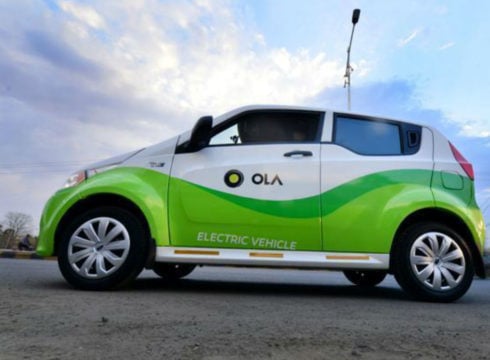SUMMARY
The idea was discussed during a meeting held in Delhi on May
Both Ola, Uber will need to start converting their fleet to from next year to achieve 2.5% electrification by 2021
Govt bodies also recommended that all new cars which will be sold for commercial use should only be electric from April 2026
Inc42 Daily Brief
Stay Ahead With Daily News & Analysis on India’s Tech & Startup Economy
The Indian government is reportedly planning to direct cab aggregator platforms such as Ola and Uber to convert 40% of their fleet of cars to electric vehicles by April 2026. In a meeting held on May 28, Niti Aayog officials and the ministries of road transport, power, renewable energy and steel, as well as the departments of heavy industries and trade recommended the need for switching to electric vehicles.
Citing central government sources, an exclusive report by Reuters claims the proposal was highlighted during government meetings late last month regarding the new rules for emobility. Cab-hailing giants Ola and Uber will need to start converting their fleet to EVs from next year to achieve 2.5% electrification by 2021, 5% by 2022, 10% by 2023, before hiking it to 40% by April 2026.
During the meeting, the authorities also recommended that all new cars which will be sold for commercial use have to be electric vehicles from April 2026.
Ola And Uber’s Electric Vehicles In India
Bengaluru-based Ola has been bullish towards its electric vehicle business. It entered into the EV space with an electric car fleet in 2017 under a pilot programme in Nagpur with an initial investment of $8 Mn. However, just after nine months, the project failed due to the dissatisfaction of Ola drivers.
The failure, however, did not prevent Ola from exploring the electric vehicle space. In March, it set up the Ola Electric Mobility subsidiary. In the same month, it raised $56Mn funding from investors such as Tiger Global and Matrix India. This was followed by a $300 Mn investment from South Korean automaker Hyundai Motors along with its affiliate Kia Motors. Also, Ratan Tata had invested an undisclosed amount in Ola Electric’s Series A round.
In order to stay ahead in the electric vehicles space, it also appointed Arun Sarin, former CEO of Vodafone Group, to the Ola Electric board.
US-based cab hailing giant Uber is also looking to strengthen its electric mobility footprint in India. While the company is yet to launch its electric vehicle offering in India, it was recently reported that it partnered with Bengaluru-based dockless bicycle sharing platform Yulu for EV two-wheeler services to fulfil short-distance journeys and last-mile commuting. While the Yulu application will not be integrated into Uber, the Uber app will redirect users to the registration page of Yulu to book electric bike or bicycles.
Earlier reports have claimed that central government think tank NITI Aayog’s chief executive Amitabh Kant has suggested a complete switch to the use of electric two and three wheelers in India in a phased manner from March 31, 2023. The proposal contemplates banning the sales of all internal combustion engine (ICE) three-wheelers by March 2023, and two-wheelers below 150 cc by 2025.
After the electric vehicle industry stated their concerns about the lack of a proper roadmap for the development of the EV space in India, the central government has stepped up its efforts to achieve 30% emobility by 2030. This includes creating a draft policy to tackle the charging infrastructure gaps.
Also, the Department of Heavy Industries has also called for proposals from state transport departments to fulfil deployment of 5K electric buses, to be supported under the Fame II scheme.
State governments are also taking several initiatives to boost emobility. Recently, it was reported that the Delhi state government is planning to incentivise the use of electric vehicles by various online consumer service companies such as Amazon, Zomato, LensKart and Grofers for deliveries to consumers.
Note: We at Inc42 take our ethics very seriously. More information about it can be found here.


